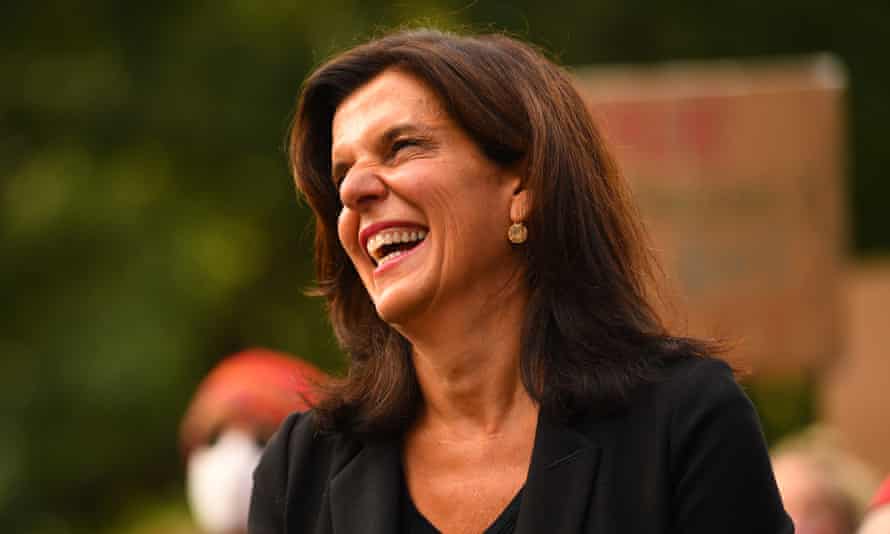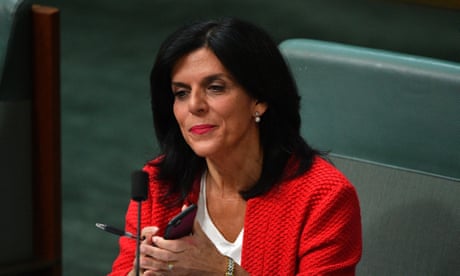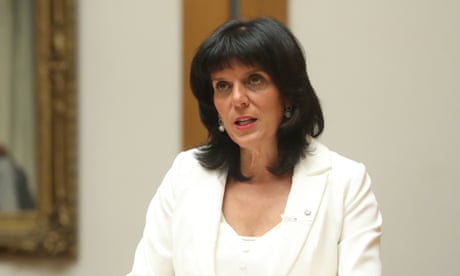Extract from The Guardian
The former MP is not the only woman this year who’s lined up to articulate her truth. It’s a new moment in Australian public life.

‘Julia Banks’s most recent herd violation involves publishing a memoir about her time in politics.’
Last modified on Sat 10 Jul 2021 06.02 AEST
Julia Banks has been struggling to keep tabs on all the different versions of herself, the Julia-bots if you will, that have appeared in the national discourse since the former MP began speaking out against the blokey culture in the Liberal party.
Banks decided not to re-contest the 2019 election as a Liberal shortly after the party’s right faction power brokers moved on Malcolm Turnbull in 2018. The 50-something former corporate lawyer (with the acuity to take a Victorian marginal seat in 2016 from Labor – a state where Labor over-performs) made her decision to part ways with the government using reason, not rage.
But then she witnessed Scott Morrison telling the world she was not coping. With news of her departure breaking, Banks watched Morrison tell reporters: “I’m supporting Julia and I’m reaching out to Julia and giving her every comfort and support for what has been a pretty torrid ordeal for her.” The prime minister expressed concern for Banks’s “welfare and wellbeing”.
Obviously the weeks when the Liberal party put Turnbull to the sword were brutal. Tears were almost certainly shed.

Women were particularly exercised about backroom bullying as the numbers men did the rounds, tallying up votes for Peter Dutton, or for Morrison, and some were agitated enough to put their names to that charge. Banks was a Turnbull backer, and carried the distress that people with empathy carry when they see a person they respect being bundled out of the prime ministership.
It is possible that Morrison sought to be empathetic in his observations about Banks’s wellbeing. Some political alphas are capable of empathy, even though the two states would seem to be contradictory.
It is also possible that the thrusters and high achievers of politics become so acculturated to winner takes all, so immersed in the brutal custom and practice of their own ecosystem, that they become desensitised and lose perspective.
From where I sit, comfortably outside the matrix of party room psychologies and the familial bonds of party membership, Banks recoiling from the worst of major party politics, backing away from that car crash, is an intelligent human response, not some bizarre aberration requiring an anti-anxiety intervention. I can see (without needing further explanation) that leaving would have felt much smarter at that point in time than staying.
At the time Morrison was worrying publicly about Banks’s wellbeing, he had just seen off Dutton by sprinting lightly up the middle. Morrison had made off with the prize of the prime ministership. It was in his interests to move on from all that nastiness and any unhelpful postmortems as soon as possible.
Political parties are like herds, and the Liberal party herd had split in full public view. It was important for Morrison to corral the livestock after the bad business, and quickly, and herds expel their self-identified weaklings. Morrison resets and reframes with alacrity when events demand that agility, and the new prime minister was very obviously seeking to control the narrative around Banks’s departure – as leaders always do when defections are untidy for them.
From her vantage point, shots fired.

So giving every comfort was the first Julia-bot – Julia, but not really Julia. As she puts it to me on my podcast this weekend, this character was weak petal. Damaged.
More Julia-bots followed as Banks parted company with the Liberals and attempted (unsuccessfully) to win the seat of Flinders as an independent; traitorous tropes festooned in a Julia Banks costume, floating, untethered, in bitterly contested #auspol space.
Banks’s most recent herd violation involves publishing a memoir about her time in politics. After extracts from Power Play hit news outlets last weekend, the former MP read she was “perhaps” being encouraged by the Labor party to damage the Coalition because of her bitterness over the leadership spill. This insight was from her former Victorian colleague Sarah Henderson in a piece published by the Daily Telegraph.
Banks notes that weak petal morphed into “Malcolm Turnbull telling me what to do every day after he left” and now (“perhaps”) she’s taking instructions from the Labor party, or “Malcolm Turnbull or whoever – someone, some man somewhere” – a dizzying journey through the “sexist spectrum”.
“Suddenly I haven’t got a mind of my own – I didn’t make those decisions” – an out-of-body experience that for Banks has been both traumatic and funny. The ratio between trauma and humour ebbs and flows depending on the ferocity of the cycles of banishment.
When it comes to Australian women in public life, lining up to articulate their truth – this has been the most extraordinary year. From where I sit, watching national affairs, filing around the clock, you can sometimes lose the extraordinary, because it can creep up in increments.
Increments, like Brittany Higgins on the stage at Women’s March 4 Justice – just adjacent to where Tony Abbott had stood placidly in front of “Bob Brown’s bitch” posters attacking Julia Gillard only a few years earlier. That still surreal incident when Morrison, at a press conference ostensibly about apologising for being tone deaf about the Higgins matter, launched a coded attack on the journalist who broke the story, Samantha Maiden of news.com.au – an attack that rebounded on him.
Higgins, who kicked the hornet’s nest, the young woman who created space for others to occupy, must be exhausted with all the inquiries and the police and the lawyers. Having to retrace steps constantly, accounting to different people, would be taxing. Also wearing: the burden of being the catalyst bumping the parliament very slowly in the direction of more normalised workplace conventions.
In this new series, women in politics tell their stories. I’ve known a number of the women featured in this program for years. Some of these women, only five minutes ago, would have considered it weakness to narrate gendered professional experiences publicly in such an honest way; they would have feared their stories would be weaponised against them.
Women of my generation understand, without having to be told, the pitfalls and perils of owning your gender, of sharing the universality of experience that comes with being a woman trying to rise in male-dominated fields.
Women’s storytelling has always been considered more domestic, less authoritative. So we bland out, and anonymise the voice. We muffle our footfalls. We rise by blending in, not by asserting difference.
But these political women on Ms Represented assert their difference with a new confidence. Long may that continue.
No comments:
Post a Comment